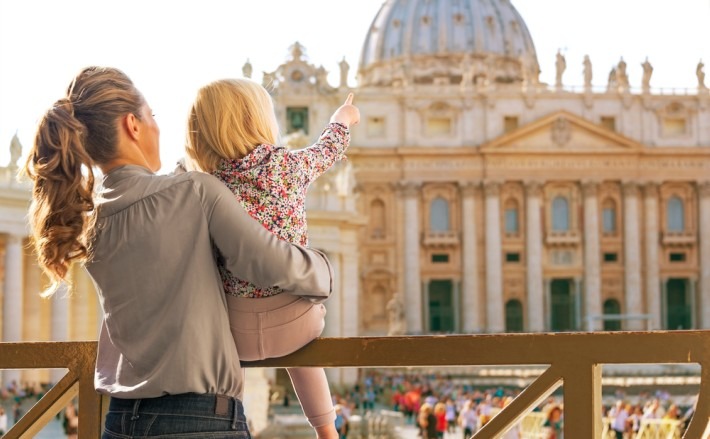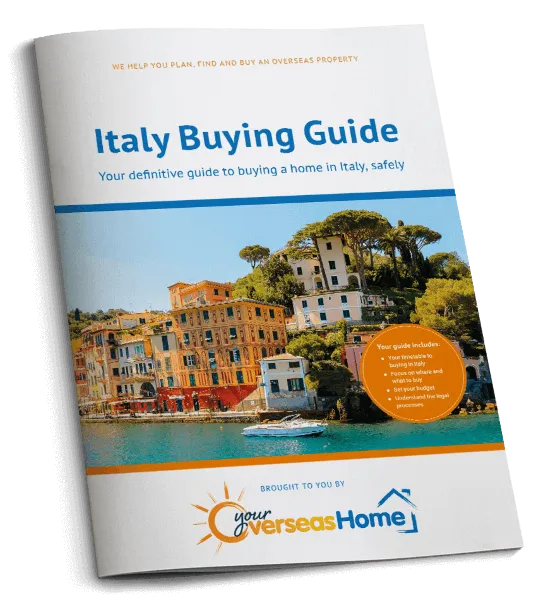When you go to live in Italy you may wonder how you’ll get over the culture shock. Learn these five easy lessons to living like an Italian, however, and you’ll never want to queue, get drunk or wear socks with sandals again
After nine years in Puglia the appearance and ways of Italians seem normal to me now. In fact when I visit England, it’s the British who seem a little odd! Of course everyone is an individual and there are always exceptions, but there are certain characteristics of Italian and British. Here, then, are my five top tips for being just a little bit more Italian.
Find homes in Italy via our property portal.
Smarten up!
When I meet family from the airport in Italy you can always spot the British coming through the arrivals gate. Tired, stressed, lily white; dressed in Bermuda shorts or socks with sandals; there’s no mistaking them from the tanned Italians wearing designer labels. Italians always look relaxed, like they’re gliding along a catwalk. You can still dress for comfort in Italy, in designer jeans and trainers, you just wear them with a fitted shirt and jacket.
Swap your shorts for some speedos to blend in with the locals.
If you’re a young man, take care of your hairstyle and wear your trousers or shorts so tight you need a man-bag to carry your wallet. Ditch those loose-fitting shorts on the beach too: Italian men cruise up and down the shoreline in small speedos.
Kiss without touching
When Italians meet their friends and family, anywhere, in a café, in the street, in the supermarket, they will kiss them on two cheeks, right then left. When meeting up with a big group it can take some time to get around everyone, but the Italian way is to stand chatting in the middle of the pavement or shopping aisle totally oblivious to anyone trying to pass.
The British still tend to go for a handshake and maybe a quick hug, although expats in Italy have adopted the cheek kissing. But note, the kiss shouldn’t actually touch the cheek, it’s just placed in the air beside it. Don’t get carried away and start placing big smackeroonies on the cheeks of your Italian host!

Dining with friends.
Italians are tactile though, so you’ll need to get over that British reserve concerning personal space. It’s commonplace to see straight Italian men walking arm in arm with a male friend. Babies are there to be fussed over amid cries of “Bellissimo!” but you’re never too old to be grabbed and cooed over if you meet an elderly person.
If you’re driving and see a friend in the car coming towards you, stop alongside and have a chat. The queue of cars behind will wait patiently for you to finish.
Learn the hand lingo
People-watch outside any café in Italy and you’ll hear loud conversations that sound like an argument, but always end with a cheeky grin and a pat on the back. Even if you can’t understand the words you can usually get the gist from the hand gestures. A thumb twisted in the cheek or swept down the jaw line is usually accompanied with the word “Buono”, to indicate that the food is good. To offer a drink you make a fist with your thumb out stretched, like a bottle neck, and lift it up to your mouth. This usually refers to wine, of course. When gesturing to eat, Italians will put their fingers to their mouth, their version of the British mime of using a knife and fork.
It’s fun to learn all the Italian hand gestures.
Eat and drink like an Italian
My Italian friends are pretty predictable with their eating and drinking habits. Firstly, milk or coffee with biscuits or brioche for breakfast, although a few are trying the British habit of cereal or toast. Mid-morning means a coffee at their nearest café, where they can have a chat with neighbours, often with a pastry. Visit the same café regularly is the easiest way to become accepted as a local. Lunch is the main meal of the day and is usually about two o’clock, once the children have finished school at ten past one and Dad has got back from work. Pasta is always on the table along with meat, salad or vegetables, and fruit for dessert. Wine and water are the usual drinks. They will always sit at the table as a family, some even go to “Nonna’s” house for lunch.
Italians don’t go out to get drunk like some British.
It is the time of day when the whole family sit down together and discuss everything from politics to local gossip. A typical conversation might begin “You know Maria? Yes you do, she’s married to Mimmo the plumber, lives next door to Maurizio and Francesca, he has a pizzeria in Via Roma, good pizza but more expensive than at Giuseppe’s….”.
As expats, we haven’t adopted the big lunch ourselves. Instead we have the good English eggs and bacon mid-morning and grab something light for lunch. The only time the Italians might have a sandwich for lunch is if they are going to the beach, in which case they will pick up a panini from the bakers.
The biggest difference I have found is when you go out in the evening. Italians don’t go out to get drunk like some British. They go out to meet up with friends, to enjoy each other’s company. They may have an aperitif, and young men will drink small bottles of beer, but in nine years I have never seen one drunk. They are just as likely to be sat with a bottle of water or Coca Cola.

: Taking time to enjoy the view.
Family comes first
Family is the most important thing for Italians. Even those with large companies to run will make sure they have quality time with their children. They work to support their families, but don’t let it take over their lives. The days of large Italian families have gone, with Italian women giving birth to 1.39 children on average, compared to a 1.58 average across the EU.
Because families like to live close together, children often have cousins and second cousins living close by, who are treated like brothers and sisters. Italian mothers famously dote on their sons, which can cause problems for the daughter-in-law, once their precious offspring wants to get married.
Family is the most important thing for Italians.
Young people are not overly encouraged to leave home and get a job. Parents seem very happy for them to stay at home well into their thirties, and only leave to get married. Even then, they are likely to start married life in an apartment in the same building or very close by. Some brave young Italians do move away to University or work, but still come home as often as they can.
The British are brought up with queues and the need for punctuality, whereas the Italians bundle around a check out and invariably turn up at least an hour late, or even the following week. The slower pace of life and lack of urgency is something the British find difficult to get used to when they first move to Italy, along with the scary driving habits. As foreigners in their country it is up to us to get used to their ways, rather than start a frustrating battle to change them. If you don’t want to end up as one of the expats who look for things to complain about then it is better to brush aside any little irritations and embrace a more relaxing life. In Italy you can take the time to enjoy your food, appreciate good company, and notice the many beauties Italy has to offer.











